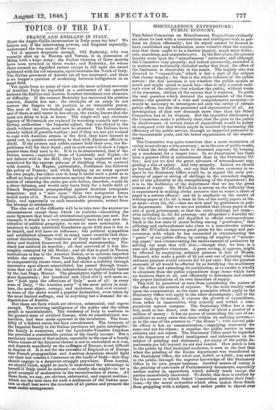TOPICS OF THE DAY.
FRANCE AND ENGLAND IN ITALY.
Dons the Anglo-Gallic intervention in Italy come too late f We believe not, if the intervening powers, and England especially, understand the true state of the case. Yet it appears desperate enough. Old Radetzky, who was recently shut up in Mantua and Verona, is in possession of Milan with a huge army : the Italian victories of three months have been reversed in three weeks; and Radetzky, for whom there seemed no dignified retreat except to fall upon the sword reddened with his old triumphs, again bestrides the North of Italy. The Italian provinces of Austria are all but recovered ; and there is no longer a question of mediating between belligerents in an equal field.
Yet again from no point of view can the mere military recovery of Austrian Italy be regarded as a settlement of the question between the Italians and Austria. It rather introduces new elements of difficulty. If the veteran Radetzky has recovered his pristine renown, Austria has not : the triumphs of an army do not restore the Empire to its position as an irresistible power. The nest of the two-beaked eagle is aflame with revolution ; and if there is still terror in her swoop, the victim knows that she must not delay to loqk at home. The single will and obstinate bigotry of Metternich are replaced by wavering councils and con- flicting authorities : the Imperial signet, that was obeyed to the death without question, must now be attested. The Italians have already talked of guerilla warfare ; and if they are not yet trained to cope with Austrian armies in the field, they have learned to speak out, to question authority, to deal with Austrian officials in detail. If the princes and nobles cannot hold their own, the Re- publimns will try their band ; and in such case will show a larger muster than they used to do. It is to be remembered, that if the Italian armies—especially those of Lombardy and Naples—do not behave well in the field, they have been neglected and de- moralized for the express purpose of disabling them to contend with Austria. In Naples, particularly, Ferdinand has followed the policy of Francis; and, while keeping up an army against his own people, has taken care to keep it under such a point as to afford no hope of native resistance against the master power. Any notion of restoring the status quo ante bellum, therefore, would be a sheer delusion, and would only leave Italy for a battle-field of French Republican propagandism against Austrian retrograde despotism : and a " nice mess " those two antagonist forces would make of it. Nor can England, after having gone so far in Italy, and apparently on such reasonable grounds, retract from the attempt at settlement. The clue out of the difficulty will be to take into the account no circumstances except those which pre realities—discarding the mere figments that beset all international questions just now. For example, it would be a very unsubstantial basis for any new dis- tribution of political geography, to rest on mere nationality. A tendency to make territorial boundaries agree with race is not to be denied, and will have its influence ; but political sympathies and established alliances will in many cases override that theo- retical distinction. The traditions of Italy would be a very sha- dowy and bookish framework for practical statesmanship. Flo- rence has outlived its republic ; all that survived of it was tho- roughly corrupted by the Medici ; and all that is good in Tuscan institutions is due to the Austrian Dukes, or to opinions imported within the century. Even Venice, though its republic endured to comparatively recent times, and had shown a stability through successive ages almost unparalleled, has passed through transi- tions that cut it off from the independence so ingloriously buried by the last Doge, Manioi. The prescriptive rights of Austria are more figmentaiy ; her beneficial rule (God wot I) still more so; her " hold upon the affections of Italy " most of all : in every state of Italy, " the Austrian party" is the most paltry in num- bers, the most abject, corrupt, and traitorous, that ever existed in none of the states would a popular declaration, even taken by the most limited suffrage, end in anything but a demand for in- dependence of Austria. But there are facts which are obvious, substantial, and cogent enough. The reviving intelligence of the nobles and the urban people is unmistakeable. The tendency of Italy to conform to the general state of civilized Europe, with its constitutional mo- narchies, had been made apparent in the revolution. The feasi- bility of a federal union has been corroborated. The interests of the Imperial family in the Italian provinces are quite intelligible: the family is numerous, and the Lombardo-Venetidn kingdom has provided a considerable portion of the family income. But a pecuniary interest of that nature, especially in the case of a family whose tenure of the Imperial throne is not so undoubted as it was, and depends manifestly on the suffrages of Europe, is not difficult to dispose of. It is not for the interests of England or of Europe that French propagandism and Austrian despotism should fight out their last combat a l'outrance on the lands of Italy—that they should engage in a desperate struggle anywhere. Even Austria, we should think, might be made to understand the 'advantage tc: herself if Italy could be induced—as clearly she might—to set a good example of moderation in the reconstruction of states. All these facts, we say, are obvious, substantial, and cogent realities ; which are the true data for such a settlement of the Italian ques- tion as shall best serve the interests of all parties and promote the most stable arrangement.
























 Previous page
Previous page